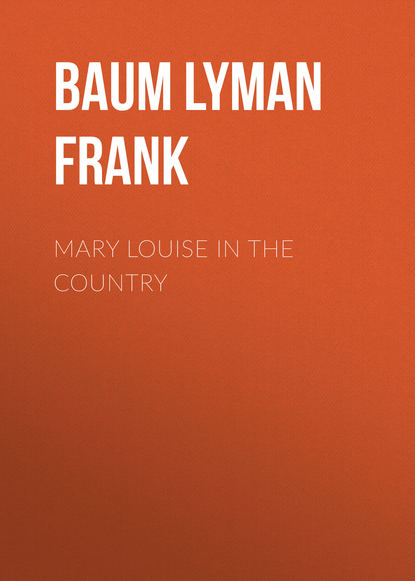По всем вопросам обращайтесь на: info@litportal.ru
(©) 2003-2024.
✖
Mary Louise in the Country
Настройки чтения
Размер шрифта
Высота строк
Поля
There was no mistaking this attitude. Old Swallowtail was calling on God to support him in this hour of trial. Josie felt something clutching at her heart. Nothing could be more impressive than this scene – this silent but earnest appeal to the Most High by the man whom she suspected of murder – of crimes even more terrible. She could see his eyes, pleading and sincere, turned upward; could see his gray hair flutter in the breeze; could see his lips move, though they uttered no sound. And after he had poured out his heart to his Maker he extended his arms upon the slab, rested his head upon them and again became motionless.
The girl waited. She was sorely troubled, surprised, even humiliated at being the witness of this extraordinary and varied display of emotion. She felt a sense of intrusion that was almost unjustifiable, even in a detective. What right had anyone to spy upon a communion between God and man?
He rose, at length, rose and walked uncertainly forward, stumbling among the ragged rocks. He made for the far hillside that was cluttered with huge fragments of stone, some weighing many tons and all tumbled helter-skelter as if aimlessly tossed there by some giant hand. And when he reached the place he threaded his way between several great boulders and suddenly disappeared.
Josie hesitated a moment what to do, yet instinct urged her to follow. She had a feeling that she was on the verge of an important discovery, that events were about to happen which had been wholly unforeseen even by old Cragg himself.
She was taking a serious risk by venturing on the stony ground, for under the moonlight her dark form would show distinctly against the dull gray of the stones. Yet she climbed the fence and with her eye fixed on the cluster of rocks where Old Swallowtail had disappeared she made her way as best she could toward the place. Should the old man reappear or the owner of the strange automobile emerge from the rocks Josie was sure to be discovered, and there was no telling what penalty she might be obliged to pay for spying. It was a dreary, deserted place; more than one grave might be made there without much chance of detection.
In a few minutes she had reached the hillside and was among the great boulders. She passed between the same ones where Mr. Cragg had disappeared but found so many set here and there that to follow his trail was impossible unless chance led her aright.
There were no paths, for a rubble of small stones covered the ground everywhere. Between some of the huge rocks the passage was so narrow she could scarcely squeeze through; between others there was ample space for two people to walk abreast. The girl paused frequently to listen, taking care the while to make no sound herself, but an intense silence pervaded the place.
After wandering here and there for a time without result she had started to return to the entrance of this labyrinth when her ears for the first time caught a sound – a peculiar grinding, thumping sound that came from beneath her feet seemingly, and was of so unusual a character that she was puzzled to explain its cause.
The shadows cast by the towering rocks rendered this place quite dark, so Josie crouched in the deepest shade she could find and listened carefully to the strange sound, trying to determine its origin. It was surely under ground – a little to the right of her – perhaps beneath the hillside, which slanted abruptly from this spot. She decided there must be some secret passage that led to a cave under the hill. Such a cave might be either natural or artificial; in either case she was sure old Cragg used it as a rendezvous or workshop and visited it stealthily on his "wakeful" nights.
Having located the place to the best of her ability Josie began to consider what caused that regular, thumping noise, which still continued without intermission.
"I think it must be some sort of an engine," she reflected; "a stamp for ore, or something of that sort. Still, it isn't likely there is any steam or electrical power to operate the motor of so big a machine. It might be a die stamp, though, operated by foot power, or – this is most likely – a foot-power printing-press. Well, if a die stamp or a printing press, I believe the mystery of Old Swallowtail's 'business' is readily explained."
She sat still there, crouching between the rocks, for more than two hours before the sound of the machine finally ceased. Another hour passed in absolute silence. She ventured to flash her pocket searchlight upon the dial of her watch and found it was nearly four o'clock. Dawn would come, presently, and then her situation would be more precarious than ever.
While she thus reflected the sound of footsteps reached her ears – very near to her, indeed – and a voice muttered:
"Come this way. Have you forgotten?"
"Forgotten? I found the place, didn't I?" was the surly reply.
Then there passed her, so closely that she could have touched them, three dim forms. She watched them go and promptly followed, taking the chance of discovery if they looked behind. They were wholly unconscious of her presence, however, and soon made their way out into the open. There they paused, and Josie, hiding behind a high rock, could both see and hear them plainly.
One was old Cragg; another a tall, thin man with a monocle in his left eye; the third, she found to her surprise, was none other than Jim Bennett the postman. The tall man held in his arms a heavy bundle, securely wrapped.
"You'll surely get them off to-morrow?" said Cragg to him,
"Of course," was the answer. "You may be certain I'll not have them on my hands longer than is necessary."
"Do you mean to play square, this time?"
"Don't be a fool," said the tall man impatiently. "Your infernal suspicions have caused trouble enough, during the past year. Hidden like a crab in your shell, you think everything on the outside is going wrong. Can't you realize, Cragg, that I must be loyal to C. I. L.? There's no question of my playing square; I've got to."
"That's right, sir," broke in Jim Bennett. "Seems to me he's explained everything in a satisfactory manner – as far as anyone could explain."
"Then good night," said Cragg, gruffly, "and – good luck."
"Good night," growled the tall man in return and made off in the direction of the automobile, carrying the package with him. The other two stood silently watching him until he reached the car, took his seat and started the motor. Presently the machine passed out of sight and then Bennett said in a tone of deepest respect:
"Good night, Chief. This meeting was a great thing for C. I. L. It brings us all nearer to final success."
"I wish I could trust him," replied Cragg, doubtfully. "Good night, Jim."
The postman made off in another direction and the old man waited until he had fully disappeared before he walked away over the stones himself. Josie let him go. She did not care to follow him home. Weary though she was from her long vigil she determined to examine the rocks by daylight before she left the place.
The sun was just showing its rim over the hills when she quitted Hezekiah Cragg's five acres of stones and took the lane to the highway. But her step was elastic, her eyes bright, her face smiling.
"I've found the entrance, though I couldn't break in," she proudly murmured. "But a little dynamite – or perhaps a few blows of an axe – will soon remove the barrier. This affair, however, is now too big and too serious for me to handle alone. I must have help. I think it will amaze dear old Dad to know what I've stumbled on this night!"
CHAPTER XVIII
DOUBTS AND SUSPICIONS
Mary Louise entered her friend's room at seven o'clock and exclaimed: "Not up yet?"
Josie raised her head drowsily from the pillow.
"Let me sleep till noon," she pleaded. "I've been out all night."
"And did you learn anything?" was the eager question.
"Please let me sleep!"
"Shall I send you up some breakfast, Josie?"
"Breakfast? Bah!"
She rolled over, drawing the clothes about her, and Mary Louise softly left the darkened room and went down to breakfast.
"Gran'pa Jim," said she, thoughtfully buttering her toast, "do you think it's right for Josie to be wandering around in the dead of night?"
He gave her an odd look and smiled.
"If I remember aright, it was one Miss Mary Louise Burrows who thrust Josie into this vortex of mystery."
"You didn't answer my question, Gran'pa Jim."
"I can imagine no harm, to girl or man, in being abroad in this peaceful country at night, if one has the nerve to undertake it. You and I, dear, prefer our beds. Josie is wrapped up in the science of criminal investigation and has the enthusiasm of youth to egg her on. Moreover, she is sensible enough to know what is best for her. I do not think we need worry over her nightly wanderings, which doubtless have an object. Has she made any important discovery as yet?"
"I believe not," said Mary Louise. "She has learned enough to be positive that old Mr. Cragg is engaged in some secret occupation of an illegal character, but so far she is unable to determine what it is. He's a very queer old man, it seems, but shrewd and clever enough to keep his secret to himself."
"And how about the disappearance of Mr. Joselyn?"
"We're divided in opinion about that," said the girl. "Ingua and I both believe Mr. Cragg murdered him, but Josie isn't sure of it. If he did, however, Josie thinks we will find the poor man's grave somewhere under the stones of the river bed. There was no grave dug on our grounds, that is certain."
Colonel Hathaway regarded her seriously.
"I am sorry, Mary Louise," he remarked, "that we ever decided to mix in this affair. I did not realize, when first you proposed having Josie here, that the thing might become so tragic."
"It has developed under investigation, you see," she replied. "But I am not very sure of Josie's ability, because she is not very sure of it herself. She dare not, even yet, advance a positive opinion. Unless she learned something last night she is still groping in the dark."

















